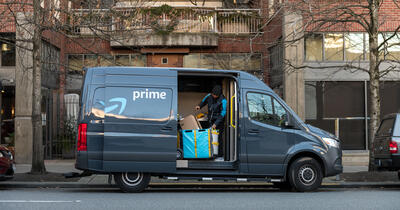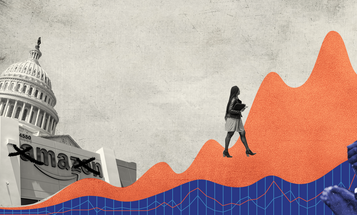
A Prime Day for the Pandemic Profiteers
Amazon has cashed in on the COVID economy, enjoying surging sales and a soaring stock price.

Amazon is such a powerful company that they put their own holiday on our calendars. This year Amazon has decreed that October 13-14 is Prime Day in the U.S., the company’s annual sales event for its members. Media outlets are abuzz with stories about how to score the best deals and smaller retailers are scrambling to offer their own bargains. So now that Amazon has grabbed our attention, it’s worth looking beyond the sales to assess the consequences of the company’s market-shaping dominance.
At the same time, predominantly Black and brown warehouse workers are suing the Amazon for failing to protect its own employees from the virus.
In the last year, Amazon has cashed in on the COVID economy, enjoying surging sales and a soaring stock price as Americans fearful of contracting the virus stayed home and ordered goods online. At the same time, predominantly Black and brown warehouse workers are suing Amazon for failing to protect its own employees from the virus. Last week, Amazon admitted that nearly 20,000 of its front-line U.S. workers have tested positive or been presumed positive for the coronavirus since March 1. And while Amazon claims the positivity rate among its employees is lower than the general population, a state-by-state breakdown published by Refinery29 reveals that this isn’t necessarily the case. In fact, Amazon’s own numbers show that Covid-19 cases at an Amazon warehouse in Minnesota were 4 times higher than the infection rate of surrounding communities.
Bezos was among a handful of billionaires who increased their personal net worth even as millions of Americans were thrown out of work and the economy went into a tailspin.
This is a classic case of pandemic profiteering: The company can reap the benefits of the crisis while leaving those with far less power—its own essential workers—to bear the life-threatening risks. It’s a winning formula for those at the top. In August, as the pandemic raged across the United States, Amazon CEO Jeff Bezos, already the world’s wealthiest person, became the first person ever to amass $200 billion in personal wealth, according to Forbes. Bezos was among a handful of billionaires who increased their personal net worth even as millions of Americans were thrown out of work and the economy went into a tailspin.
And as it hoards money, Amazon is also hoarding massive power.
In his recent testimony before the US House of Representatives, Demos President K. Sabeel Rahman made the case that tech platforms like Amazon, Facebook, Google, and Apple represent essential infrastructure just like the railroads, bridges, and telegraph lines of a century ago.
“The conduits of commerce are increasingly online through retail platforms like Amazon. The infrastructure of information now depends on web services like Amazon’s AWS [cloud computing service]… Amazon’s command of a shipping and logistics system enables Amazon to manipulate the flow of goods, and to mine troves of consumer data. That manipulation and data can then be used to choke out competitors, alter prices, and influence search results in ways that maximize Amazon’s own profits, leaving entire economic sectors, from book publishing to apparel manufacture, at the whim of Amazon’s decisions…
“We have seen how Amazon has, for example, leveraged its dominance over online retail transactions to undercut competitors and engage in predatory pricing. That same market dominance has enabled Amazon to pressure state and local governments for more favorable regulatory treatment and subsidies, even as it undermines enforcement of workplace safety laws that would protect Amazon workers—particularly Black and Latinx “essential” workers, who face astronomically high injury rates more than double the industry average, and that have become hotspots for COVID-19 transmission.”
Yet as powerful as Amazon is, as much sway as the company exercises over our economy and our daily lives, it is not invulnerable
Yet as powerful as Amazon is, as much sway as the company exercises over our economy and our daily lives, it is not invulnerable. Last week the House Judiciary Committee’s Antitrust Subcommittee released a report drawing on testimony from Rahman and other experts, firms, and market participants. The report recommends that Congress break up market-dominating corporations like Amazon, just as it did with railroads and telecommunications companies in past decades.
Recommendations include structural separations that could, for example, prohibit Amazon from continuing to own both the online retail portal and the production and selling of its own branded goods on that portal; rules to prevent the anticompetitive discrimination, favoritism, and self-preferencing rampant at Amazon; elimination of the forced arbitration clauses that Amazon uses to prevent 3rd party sellers from holding it accountable in court; and general updates to anti-trust laws to bring them into line with the digital economy.
Breaking up power concentrated in white hands is a key step toward shifting greater power and economic control to Black and brown communities.
As Rahman pointed out, ending the market dominance of companies like Amazon would help jumpstart Black- and brown-owned businesses struggling to stay alive and afloat in a tremendously challenging economy, and would strengthen the hand of Black and Latinx workers seeking higher pay and improved workplace safety. Breaking up power concentrated in white hands is a key step toward shifting greater power and economic control to Black and brown communities.
When Amazon’s power is dispersed, the company may still announce big sales and declare their own holiday. It’s just less likely that markets will shift in response, that workers will be put at risk without being able to fight back, or that the rest of us will feel the need to put it on our calendars.




